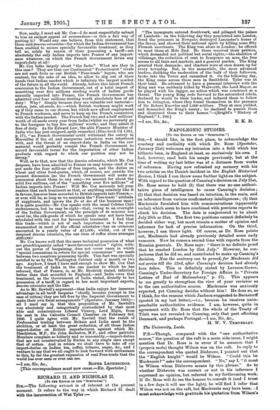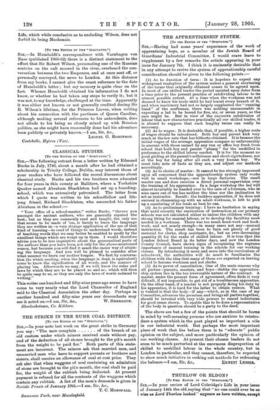[To THE EDITOR OF THE " SPECTATOR...1 SIR,—I should like,
in the first place, to acknowledge the courtesy and cordiality with which Dr. Rose (Spectator, January 21st) welcomes my intrusion into a field which has hitherto been, in England at least, so exclusively his own. I had, however, read both his essays previously, but at the time of writing my last letter was at a distance from works of reference. Having now refreshed my memory with his two articles on the Danish incident in the English Historical Review, I think I can throw some further light on the subject. With regard to the question of Canning's decision on July 21st, Dr. Rose seems to hold (1) that there was no one authori- tative piece of intelligence to cause Canning's decision ; (2) that that decision was based on intuition, in the main, and on inference from various confirmatory intelligences ; (3) that Mackenzie furnished him with communications (apparently verbal) which seem to have combined with previous reports to clinch his decision. The date is conjectured to be about July 20th or 21st. The first two positions cannot definitely be decided either way, but must remain a matter of opinion and inference for lack of precise information. On the third, however, I can throw light. Of course, as Dr. Rose points out, Mackenzie had already previously detailed some early rumours. Now he comes a second time with reports from the Russian generals. Dr. Rose says : " there is no definite proof that he reached London by 21st July." However, he con- jectures that he did so, and contributed to make up Canning's decision. Now the contrary can be proved, for Mackenzie did not arrive till the 23rd, after Canning's decision had already been taken. This is definitely stated by Leveson-Gower, Canning's -Under-Secretary for Foreign Affairs (v. " Private Letters of Earl of Malmesbury," p. 27). This appears to me greatly to strengthen the view of your reviewer as to the one authoritative source. Mackenzie was anxiously expected, yet Canning decides without him ! He does so, as I think, for the reasons which Jackson suggested to Bernstorff (quoted in my last letter),—i.e., because he receives unim- peachable authoritative evidence. I am, however, quite in agreement with Dr. Rose that the whole of the Treaty of Tilsit was not revealed to Canning, only that part affecting Denmark, and perhaps Portugal.—I am, Sir, &c., P.S.—Though, compared with the " one authoritative source," the question of the raft is a mere side-issue, I might mention that Dr. Rose is in error if he assumes that I (proprio motu) thought Wilson was on the raft. In reply to the correspondent who quoted Disbrowe, I pointed out that the "English knight" would be Wilson. " Could this be Mackenzie ?" asks the correspondent. " No," say I, " it must be Wilson whom Disbrowe means by this phrase." As to whether Disbrowe was correct or not in his inference I expressed no opinion, but referred to my forthcoming work. If Dr. Rose will do me the honour to consult it (and I trust in a few days it will see the light), he will find I infer that Wilson was not on the raft, but Mackenzie may have been. A must acknowledge with gratitude his quotation from Wilson's
Life, which while conclusive as to excluding Wilson, does not forbid its being Mackenzie.























































 Previous page
Previous page